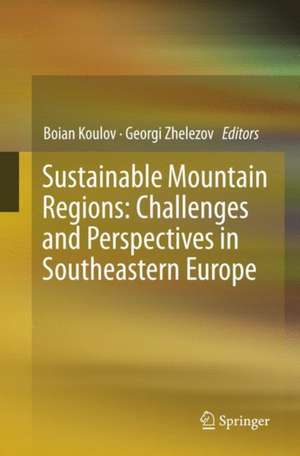Sustainable Mountain Regions: Challenges and Perspectives in Southeastern Europe
Editat de Boian Koulov, Georgi Zhelezoven Limba Engleză Paperback – 7 apr 2018
Central to this edited volume is the proposition that the mountainous border region of Southeastern Europe needs to become a special target of European Union scale, regional development policy-making. Vivid case studies from eleven Central and Southeast European states present diverse perspectives on this region’s physical geography, economy and demographics and demonstrate the integrative potential of the geographic perspective in mountain research. Europe as a whole has a lot to gain from a “sustainable mountains” policy, especially in Southeast Europe. In their focus on the sustainable development of such areas, the chapters consider regional development policy, ecosystem services assessment, small-scale tourism, and forestry management.
This book will be of interest to a wide audience, including academics, students, and practitioners in the fields of geography, ecology, and environmental studies.
| Toate formatele și edițiile | Preț | Express |
|---|---|---|
| Paperback (1) | 558.51 lei 39-44 zile | |
| Springer International Publishing – 7 apr 2018 | 558.51 lei 39-44 zile | |
| Hardback (1) | 591.80 lei 39-44 zile | |
| Springer International Publishing – 4 mar 2016 | 591.80 lei 39-44 zile |
Preț: 558.51 lei
Preț vechi: 698.13 lei
-20% Nou
Puncte Express: 838
Preț estimativ în valută:
106.87€ • 111.36$ • 88.49£
106.87€ • 111.36$ • 88.49£
Carte tipărită la comandă
Livrare economică 31 martie-05 aprilie
Preluare comenzi: 021 569.72.76
Specificații
ISBN-13: 9783319802374
ISBN-10: 3319802372
Pagini: 268
Ilustrații: XVI, 268 p. 70 illus., 14 illus. in color.
Dimensiuni: 155 x 235 mm
Ediția:Softcover reprint of the original 1st ed. 2016
Editura: Springer International Publishing
Colecția Springer
Locul publicării:Cham, Switzerland
ISBN-10: 3319802372
Pagini: 268
Ilustrații: XVI, 268 p. 70 illus., 14 illus. in color.
Dimensiuni: 155 x 235 mm
Ediția:Softcover reprint of the original 1st ed. 2016
Editura: Springer International Publishing
Colecția Springer
Locul publicării:Cham, Switzerland
Cuprins
Mountain Development Policies in Bulgaria: Practices and Challenges.- Cooperation models and pluri-activity to exhaust value added potentials in mountain regions.- Applications of GIS-based Hydrological Models in Mountain Areas in Bulgaria for Ecosystem Services Assessment – Issues and Advantages.- Mapping carbon storage using land cover/land use data in area of Beklemeto, Central Balkan.- Consequences of non-intervention management for the development of subalpine spruce forests in Bulgaria.- A Model Assessment on the Technical Climate Change Adaptation Options of the Major Ski Resorts in Bulgaria.- Hydric significance of landscape in mountain river basin.- Small scale mountain tourism in Bulgaria development patterns and sustainability implications.- Beyond existing e-tourism for mountains: findings from the case of Zagori, Greece.- Sustainable tourism in mountain destinations: The actual and perceived role of a Destination Management Organization.- Biodiversity protection of the forest ecosystems on the base of representative geo-ecosystems.- Predicting the potential distribution of Ailanthus altissima invasive terrestrial plant species in Măcin Mountains National Park (Romania).- Determination of the Landscapes Regulation Capacity and Their Role in the Prevention of Catastrophic Events: A Case Study from the Lom River Upper Valley, Bulgaria.- GIS and RS-based modeling of potential natural hazard areas.- Spatial discrepancies of ecological networks in the border region of Serbia and Bulgaria.- Invasive plant species in the Northern part of Mala Planina.- Monitoring glacier changes with the use of archive images: the example of the Julian Alps (NW Slovenia, NE Italy).- Tourism and the Commodification of Cultural Heritage in the Eastern Black Sea Mountains, Turkey.- The role of cultural heritage in developing of mountain tourism: The case study of Mountain Rudnik, Serbia.
Recenzii
“It provides valuable insight into recent research conducted in the Southeastern European mountain regions. And thus it can be of interest to a diverse audience, including students, researchers and practitioners of different fields, e.g. in the fields of geography, ecology, environmental studies and tourism. … it reaches its goal of providing multiple pieces of evidence that sustainability principles should be used at every scale of geo-ecologic planning in mountain regions.” (Eszter Tanács, Hungarian Geographical Bulletin, Vol. 66 (1), 2017)
Textul de pe ultima copertă
Central to this edited volume is the proposition that the mountainous border region of Southeastern Europe needs to become a special target of European Union scale, regional development policy-making. Vivid case studies from eleven Central and Southeast European states present diverse perspectives on this region’s physical geography, economy and demographics and demonstrate the integrative potential of the geographic perspective in mountain research. Europe as a whole has a lot to gain from a “sustainable mountains” policy, especially in Southeast Europe. In their focus on the sustainable development of such areas, the chapters consider regional development policy, ecosystem services assessment, small-scale tourism, and forestry management.
This book will be of interest to a wide audience, including academics, students, and practitioners in the fields of geography, ecology, and environmental studies.
Caracteristici
Focusses on sustainable practices and policies for mountain areas Explores case studies from 11 countries from Central and Southeastern Europe Offers a rich resource of unpublished data Presents contributions from the best research institutes in Central and Southeastern Europe











